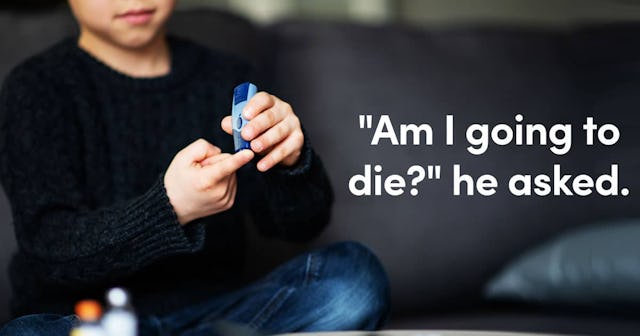What Started As A Cough Turned Out To Be Type 1 Diabetes

Hi, I’m Sam. My son has been living with Type 1 diabetes for ten years in January 2020, but let me back up for a bit and start from the beginning.
The year was 2009, and I was bitter-sweetly strolling through life as a new divorcee.
Around that time, my son had been studying foreign languages (French and Mandarin, in particular) while also trying to make ends meet through whatever freelance opportunities were available to him. In the wake of the American economy quickly going downhill, we were in turmoil — and threatened by a real-estate bubble burst that loomed over our heads like a huge bamboo leaf over our heads during monsoon season. It was hard to tell if that leaf was actually protecting our sanity, or adding up to a bulk of troubles and accumulating a “tank” of emotional rain that was to come down pouring on our heads in one huge stream of mixed emotions, mortgage, and a negative checking balance – to say the least.
But the farce was yet to unravel.
“Mom,” he said. “I’ve been coughing for six months straight. It’s like … something feels off.”
Concerned, I told my son that it was probably time for a checkup, and he agreed.
Fertnig/Getty
When the results came back in, everything was fine — except his blood sugar levels, which were elevated by quite a margin.
One thing (among many) that I learned over the course of the aftermath of his diagnosis was that it’s really strange how life works during intense, highly emotional moments. No dramatic music, no dialogue, no nothin’… just a stare, a realization, and the fear starting to creep in. My son had Type 1 diabetes.
“Am I going to die?” he asked.
As terrified as I was, and as confused as my son seemed to be in his effort to bring clarity to chaos, I wasn’t just going to sit around and wait for a solution to manifest itself out of thin air. And so I was quick to take action.
There was a certified endocrinologist who I knew back from my student days (yup, I’m a physician turned small business owner), practicing not far from us. A 45-minute drive, tops. I told my son to pack essentials, as we were – for a lack of a better adjective – embarking on the road trip of our lifetimes. Minus all the fun, plus all the existential dread.
Upon our arrival, the endocrinologist seemed genuinely concerned and, truth be told, kind of worried. He admitted my son right away.
My son was to share a room with two recently-diagnosed elderly Type 1s, and a younger man whose mental confusion was physically paralleled through his watery eyes, in what seemed to be a dead giveaway of his current state.
BSIP/Getty
After the initial introductions, my son was immediately administered an intravenous, rapid-acting insulin in order to bring his sugar levels down – and, equally important – get rid of any traces of ketone bodies accumulated during a period of insufficient insulin production in his pancreas.
You see, Type 1s are affected by what’s called insulin insufficiency, a condition where the so-called beta cells in the pancreas are killed off (though illness, genetic predisposition, or other factors that trigger an autoimmune response in the body). The vital thing here is that, unlike other types of cells, the beta cells do not regenerate.
Hypothetically, even if they did regenerate, the antibodies that were present before and at the time of diagnosis would most likely attack the pancreas, therefore killing the beta cells over and over again until there’s either an infinitesimal number — or none at all — left.
But my son did not know the underlying mechanisms of Type 1 diabetes at that time.
And perhaps it was for the better.
After a while, we were getting used to each other’s company again. I’ve never considered myself to be the type of parent that clings helplessly onto their progeny well after their adolescent years were long past. Back then, though, it was but the two of us: one finding hope where the other one’s fears lingered. One mirroring the joy of the other in a silent dance-off that played out in each other’s eyes like a simulacrum of colors and refractions under the cold hospital lights.
One emanating love and the other multiplying that love by a factor of thousands – millions even, and… yeah, I’ve run out of linguistic tropes.
When I say “I love Type 1 diabetes,” of course I don’t mean it literally.
But what I love about it is the way that it allowed me to reconnect with what’s really important in life. Or, to quote Mr. Freeman in “Through The Wormhole”:
“Mythology says that the gods envy our mortality. Our mortality is what makes life precious and something to be savored. Driven by the pressure of time to achieve greatness, it may be our mortality that gives us our humanity. But as long as we are mortal, we will never stop dreaming of life everlasting. That too, is what makes us human.”
This article was originally published on